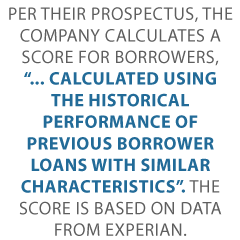- Connect With Us!
- (877) 600-2487
- info@creditsuite.com
Learn How to Get Great Funding with our Prosper Online Lender Review
Published By Janet Gershen-Siegel at March 9th, 2018
A Prosper Bank Review
This online lender is one of several online lending companies out there. In our Prosper loans reviews, we look at just what sets this online lender apart from the others.
They offer personal loans for business use. However, it seems as if applications for business loans always went to their partner, OnDeck (https://www.ondeck.com/), regardless of personal credit rating or amount of credit requested. We look at the specifics and drill down into the details with respect to this company.
Background
The company is located online here. Their physical address is:
Prosper Funding LLC
221 Main Street, Suite 300
San Francisco, CA 94105.
You can call them at: (866) 615-6319. Get in touch with them via their contact page.
Code of Ethics and Business Conduct
They abide by a Code of Ethics and Business Conduct.
The main thrust of the Code is to support standard disclosures of conflicts of interests.
Employees have restricted access to company loans, in order to make it harder to exploit inside information. This is somewhat similar to the SEC’s insider trading rules for publicly traded corporations.
The Code also means their employees cannot accept substantial gifts.
However, this may be to deter overly enthusiastic but well-meaning clients who have a hard time taking no for an answer. With the Code, the company can be the ‘bad guy’.
The Code also specifically protects whistle blowers in case an employee witnesses and reports wrongdoing to management.
Going Public
On April 30, 2019, the company presented its second prospectus to the Securities and Exchange Commission. This is a document filed before presenting an Initial Public Offering (IPO).
The funding is for up to $1.5 billion.
If accepted by the SEC, the company could begin offering stock to the public in the 2020s.
Prosper Personal Loans for Business Use
From $2,000 – 35,000 is available but be sure to do your own Prosper personal loans review. They will check your personal credit score. But there is no information on a Prosper loan minimum credit score. Rates are “low” yet otherwise unspecified. For a Prosper personal loan, the company offers a fixed term of 3 or 5 years. You have a single monthly payment. There is no information on Prosper personal loan rates.
The Prosper Credit Score
Per their prospectus, the company calculates a score for borrowers, “… calculated using the historical performance of previous Borrower Loans with similar characteristics”. The score is based on data from Experian.
The Score predicts the probability of a loan going “bad”, e. g. going more than 60 days past due within twelve months of the application date. The score works as the foundation of Prosper lending requirements.
Risk Modeling
To calculate the company credit score, the company developed a custom risk model by using their historical data in addition to a data archive from a consumer credit bureau. They use this Prosper loan calculator to determine if you’re a good credit risk for them.
They built the model based upon a population of users who applied for a Borrower Loan. This was so that their model would incorporate behavior which is unique to that population.
A Prosper loans credit score is in contrast to a credit score from a credit reporting agency. That is based on a much broader population.
However, borrowers from this lender are only a small subset of those under consideration when developing a standard consumer credit score. The company then uses both the Prosper loan credit score and a borrower’s credit score to best gauge the level of risk. Their Prosper loan application will, of course, be under review.
Fees
There are no hidden fees or prepayment penalties.
Advantages
Advantages include fixed terms and no hidden fees. They say there is no Prosper origination fee.
Disadvantages
Disadvantages include an unspecified interest rate. Also, they will perform an inquiry on your personal credit. Are you wondering, “is Prosper loan safe?” The answer is: maybe.
An Alternative: Building Business Credit
Small business credit is credit in a small business’s name. It doesn’t connect to an owner’s consumer credit, not even if the owner is a sole proprietor and the only employee of the small business.
Therefore, a business owner’s business and personal credit scores can be very different.
This helps to secure a small business owner’s personal assets, in case of a lawsuit or business bankruptcy.
Also, with two distinct credit scores, a business owner can get two separate cards from the same merchant. This effectively doubles buying power.
Another benefit is that even startup businesses can do this. Heading to a bank for a business loan can be a recipe for frustration. But building small business credit, when done the right way, is a plan for success.
Personal credit scores are dependent on payments but also various other components like credit use percentages.
But for business credit, the scores really merely hinge on if a business pays its debts punctually.
The Process
Establishing company credit is a process. It does not happen without effort. A small business needs to proactively work to build small business credit.
However, it can be done easily and quickly, and it is much swifter than building personal credit scores.
Merchants are a big aspect of this process.
Accomplishing the steps out of sequence leads to repetitive denials. No one can start at the top with business credit. For example, you can’t start with retail or cash credit from your bank. If you do, you’ll get a rejection 100% of the time.
Company Fundability
A business has to be fundable to loan providers and merchants.
For that reason, a small business needs a professional-looking web site and e-mail address. And it needs to have site hosting bought from a merchant like GoDaddy.
And also, company telephone and fax numbers should have a listing on 411. You can do that here: http://www.listyourself.net.
At the same time, the company telephone number should be toll-free (800 exchange or the equivalent).
A business also needs a bank account dedicated solely to it, and it must have every one of the licenses necessary for running.
Licenses
These licenses all must be in the particular, correct name of the company. And they need to have the same company address and telephone numbers.
So note, that this means not just state licenses, but possibly also city licenses.
Learn more here and get started with building business credit with your company’s EIN and not your SSN.
Dealing with the IRS
Visit the Internal Revenue Service web site and get an EIN for the small business. They’re free. Choose a business entity such as corporation, LLC, etc.
A small business can start off as a sole proprietor. But they probably wish to switch to a type of corporation or an LLC.
This is to limit risk. And it will optimize tax benefits.
A business entity matters when it pertains to taxes and liability in case of litigation. A sole proprietorship means the business owner is it when it comes to liability and taxes. Nobody else is responsible.
Setting off the Business Credit Reporting Process
Start at the D&B web site and get a free D-U-N-S number. A D-U-N-S number is how D&B gets a small business into their system, to produce a PAYDEX score. If there is no D-U-N-S number, then there is no record and no PAYDEX score.
Once in D&B’s system, search Equifax and Experian’s web sites for the business. You can do this at fastcs.wpengine.com/reports. If there is a record with them, check it for accuracy and completeness. If there are no records with them, go to the next step in the process.
This way, Experian and Equifax have something to report on.
Learn more here and get started with building business credit with your company’s EIN and not your SSN.
Vendor Credit Tier
First you need to build trade lines that report. This is also called the vendor credit tier. Then you’ll have an established credit profile, and you’ll get a business credit score.
And with an established business credit profile and score you can begin to get credit in the retail and cash credit tiers.
These kinds of accounts often tend to be for the things bought all the time, like marketing materials, shipping boxes, outdoor workwear, ink and toner, and office furniture.
But to start with, what is trade credit? These trade lines are credit issuers who give you starter credit when you have none now. Terms are in most cases Net 30, rather than revolving.
Hence, if you get approval for $1,000 in vendor credit and use all of it, you must pay that money back in a set term, such as within 30 days on a Net 30 account.
Retail Credit Tier
Once there are 5 to 8 or more vendor trade accounts reporting to at least one of the CRAs, then progress to the retail credit tier. These are service providers such as Office Depot and Staples.
Just use your Social Security Number and date of birth on these applications for verification purposes. For credit checks and guarantees, use the company’s EIN on these credit applications.
One such example is Lowe’s. They report to D&B, Equifax and Business Experian. They need to see a D-U-N-S and a PAYDEX score of 78 or more.
Fleet Credit Tier
Are there 8 to 10 accounts reporting? Then move onto the fleet credit tier. These are businesses like BP and Conoco. Use this credit to buy fuel, and to fix, and maintain vehicles. Only use your SSN and date of birth on these applications for verification purposes. For credit checks and guarantees, make sure to apply using the business’s EIN.
One such example is Shell. They report to D&B and Business Experian. They want to see a PAYDEX Score of 78 or better and a 411 small business telephone listing.
Shell may say they want a specific amount of time in business or profits. But if you already have enough vendor accounts, that won’t be necessary. And you can still get an approval.
Cash Credit Tier
Have you been sensibly handling the credit you’ve up to this point? Then move onto the cash credit tier. These are service providers such as Visa and MasterCard. Just use your SSN and date of birth on these applications for verification purposes. For credit checks and guarantees, use your EIN instead.
One such example is the Fuelman MasterCard. They report to D&B and Equifax Business. They want to see a PAYDEX Score of 78 or better. And they also want you to have 10 trade lines reporting on your D&B report.
Plus, they want to see a $10,000 high credit limit reporting on your D&B report (other account reporting).
In addition, they want you to have an established business.
These are businesses such as Walmart and Dell, and also Home Depot, BP, and Racetrac. These are commonly MasterCard credit cards. If you have 14 trade accounts reporting, then these are in reach.
A Word about Building Business Credit
Always use credit smartly! Don’t borrow more than what you can pay off. Keep an eye on balances and deadlines for repayments. Paying off punctually and fully does more to boost business credit scores than virtually anything else.
Establishing small business credit pays. Good business credit scores help a small business get loans. Your loan provider knows the company can pay its financial obligations. They recognize the company is bona fide.
The small business’s EIN attaches to high scores and lending institutions won’t feel the need to demand a personal guarantee.
Learn more here and get started with building business credit with your company’s EIN and not your SSN.
Prosper Rates and More, on Balance
Given that the company likely to go public soon, their Board of Directors will be beholden to shareholder demands. This is as opposed to the requests of either borrowers or employees.
Furthermore, the company seems to shunt all small business loans off to OnDeck, anyway. It seems the best action for a small business owner to take is to bypass the middleman and go straight to OnDeck.
And finally, as with every other lending program, read the fine print and do the math. Go over the details carefully, and decide whether this option will be good for you and your company.
In addition, consider alternative financing options that go beyond lending, including how to build business credit, to best decide how to get the money you need to help your business grow. Share this if you agree with our Prosper loan reviews.

 " class="attachment-blog-single size-blog-single wp-post-image" alt="Get Business Credit Cards for New Businesses Credit Suite-Business Line of Credit Decoded" title="Get Business Credit Cards for New Businesses">>
" class="attachment-blog-single size-blog-single wp-post-image" alt="Get Business Credit Cards for New Businesses Credit Suite-Business Line of Credit Decoded" title="Get Business Credit Cards for New Businesses">>

